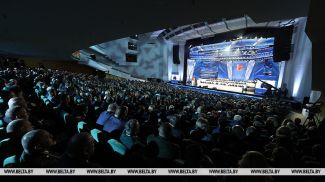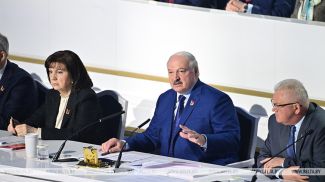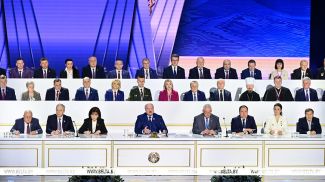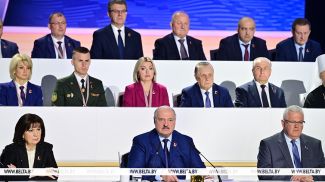MINSK, 13 December (BelTA) – It is important to provide guidance and support to medical students on their path to becoming a doctor, Belarus President Aleksandr Lukashenko said at the meeting with students and teachers of medical universities on 13 December, BelTA has learned.
“It is necessary to strengthen responsibility of each supervisor for training medical interns and for getting them fit for practicing medicine on their own. I absolutely agree with it. Mentoring is very important in medicine. Experienced doctor should be able to identify and support talents, share their knowledge and skills and nurture a new generation that will be worthy of their profession,” the head of state said.
Speaking about the way a fledgling doctor turns into a real professional, Aleksandr Lukashenko noted that practical healthcare in Belarus compares favorably to other CIS states in terms of the quality of medical training because it retained pre-graduate internship and internship for senior medical students. “Specialists say that this is an important bridge that allows adapting and acquiring experience for practicing medicine unsupervised in the future. This is what specialists say. I will think about it. I am not ready to support or reject this idea now,” the president said.
The elimination of internship in Russia and Kazakhstan is blamed by many specialists for certain issues in continuous medical education when it comes to the way they apply competences gained in the classroom into practice. “We are not going to follow suit,” Aleksandr Lukashenko said.
All in all, the head of state pointed out that rapid advancement of high technology medicine prompts the healthcare sector to introduce new forms of training. Over the last three years, a network of training centers has been established in the country's leading national research centers. They help medical practitioners learn new skills in diagnostics and treatment in heart surgery, neurosurgery, transplant surgery, hematology, oncology, pediatric surgery and trauma.
“We need to make the most of the capacities of such centers in order to teach doctors to perform high technology surgeries. Clinicians seeking to learn a subspecialty need to undertake two or three years of efficient advanced training. They say that it will take two or three years. Let us start from a year,” Aleksandr Lukashenko said.
“The most important thing is to train a highly qualified specialist able to perform most sophisticated surgeries,” the Belarusian leader said.
He noted that graduates of Belarusian medical universities are still in demand abroad, in particular in Poland and the Baltic Sea states. “It is not a secret that many leave to acquire new knowledge and skills and many come back,” the head of state noted.











